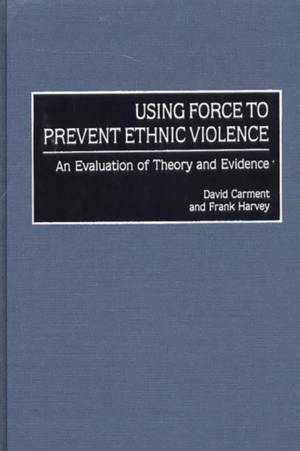
- Retrait gratuit dans votre magasin Club
- 7.000.000 titres dans notre catalogue
- Payer en toute sécurité
- Toujours un magasin près de chez vous
- Retrait gratuit dans votre magasin Club
- 7.000.0000 titres dans notre catalogue
- Payer en toute sécurité
- Toujours un magasin près de chez vous
Using Force to Prevent Ethnic Violence
An Evaluation of Theory and Evidence
David Carment, Frank HarveyDescription
More than ever before, ethnic struggle finds expression in the growing incidence and scale of displaced persons and refugee flows, as well as in exacerbated levels of ethnic minority abuse and involuntary assimilation. Demographic and political sources of instability in multi-ethnic societies assure the continuing significance of ethnic strife and the potential for intrastate ethnic violence far into the next millennium. While not all disagreements between ethnic groups can be expected to escalate into violence, more than a few have produced intractable and destructive conflicts, and one or more of these conflicts could ultimately reach levels that overwhelm international resources and capabilities.
Carment and Harvey examine how regional and international security organizations can prevent destructive ethnic conflict and manage cases in which violence already is at hand. First they develop a conceptual framework for advancing basic research on the prevention and management of intrastate ethnic violence. They evaluate theoretical knowledge about the nature of ethnic conflict, using case material and quantitative assessments, and they apply these assumptions against recent instances of conflict management through an in-depth study of NATO's involvement in Kosovo and Bosnia. This book serves as an important research tool for students, scholars, and policy makers involved with ethnic conflict and international relations.Spécifications
Parties prenantes
- Auteur(s) :
- Editeur:
Contenu
- Nombre de pages :
- 192
- Langue:
- Anglais
- Collection :
Caractéristiques
- EAN:
- 9780275969790
- Date de parution :
- 30-10-00
- Format:
- Livre relié
- Format numérique:
- Genaaid
- Dimensions :
- 161 mm x 242 mm
- Poids :
- 476 g

Les avis
Nous publions uniquement les avis qui respectent les conditions requises. Consultez nos conditions pour les avis.






